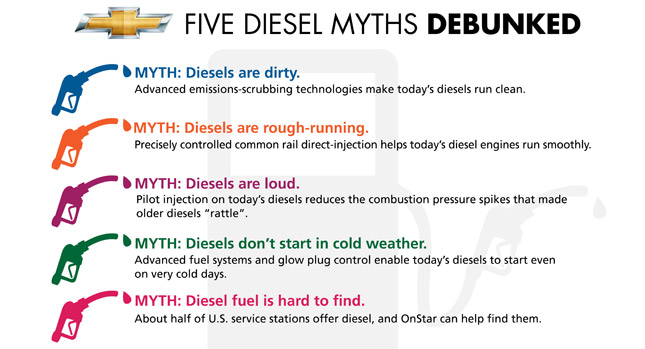Ask any European about the benefits of diesel engines in passenger cars and invariably the answer will be about fuel efficiency and increased reliability over gasoline units.
It has taken Americans more than two decades to re-embrace diesel engines after a catastrophic attempt in the 1980s, but thanks to German automakers like Volkswagen, Mercedes and BMW, and let’s not forget, the rising cost of fuel, oil burners are on the menu again.
 While das Germans have done most of the job of informing U.S. consumers about the new generation of diesels and how they differ from their sooty and finicky counterparts of the past, GM took a moment to introduce its side of the story as it prepares for the domestic launch of the Cruze Diesel, which arrives next year.
While das Germans have done most of the job of informing U.S. consumers about the new generation of diesels and how they differ from their sooty and finicky counterparts of the past, GM took a moment to introduce its side of the story as it prepares for the domestic launch of the Cruze Diesel, which arrives next year.
GM starts by telling us that according to market research firm Baum and Associates, U.S. sales of diesel cars have the potential of doubling by mid-decade.
Currently, diesel cars account for 3 percent of U.S. sales having jumped 35 percent in the first quarter of 2012 compared to the same period in 2011. Last year, overall diesel car deliveries surged 27 percent over 2010.
General Motors said that the U.S. market Cruze Diesel will be powered by a 2.0-liter four-cylinder unit.
While the Detroit automaker did not elaborate further, chances are it will be closely based on the European engine that delivers an output of 161hp (163PS) and 360 Nm (265.5 lb-ft) of peak torque.
When equipped with a manual gearbox, the European Cruze 2.0D returns a fuel consumption of 7.3lt/100km (32.2mpg US) in the city, 4.2lt/100km (56mpg US) on the highway and 5.4lt/100km (43.6mpg US) combined.
The respective fuel economy figures for the automatic transmission model are: 8.7lt/100km (27 mpg US) city, 5.0lt/100km (47 mpg US) highway and 6.3lt/100km (37.3 mpg US) combined.
Keep in mind, however, that the fuel economy ratings are for the Euro model on the European driving cycle, and not for the upcoming U.S. market model.
The automaker prepared an info graphic that debunks five diesel myths. “The 2.0L clean turbo diesel engine coming to the Cruze has resolved drawbacks consumers associated with older generation diesel cars, such as excessive engine noise, exhaust soot and smell,” GM said in a statement. “Precisely controlled common rail direct-injection fuel systems create a smooth-running engine.”
One of the problems for diesel cars in the States is the higher price of diesel fuel, which GM says typically costs between 25 and 40 cents more than gasoline, but notes that “difference has been trending downward the past couple of years” and that diesels make up for it by being more efficient.
“Small displacement diesel engines could fill an important niche in Chevrolet’s diverse four-cylinder lineup,” said Mike Weidman, Cruze marketing manager. “We recognize this technology’s considerable appeal, particularly with young male car buyers, and we are ready to win them over with quality, torque and fuel economy.”
PHOTO GALLERY










